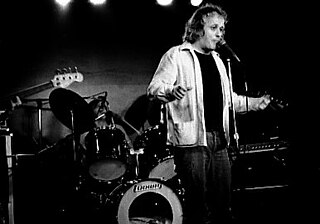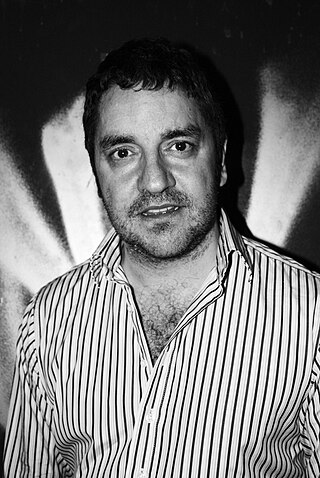
John Robert Parker Ravenscroft, better known as John Peel, was an English radio presenter and journalist. He was the longest-serving of the original disc jockeys on BBC Radio 1, broadcasting regularly from 1967 until his death in 2004.
Apple Records is a British record label founded by the Beatles in 1968 as a division of Apple Corps Ltd. It was initially intended as a creative outlet for the Beatles, both as a group and individually, plus a selection of other artists including Mary Hopkin, James Taylor, Badfinger and Billy Preston. In practice, the roster had become dominated by the mid-1970s with releases of the former Beatles as solo artists. Allen Klein managed the label from 1969 to 1973, then it was managed by Neil Aspinall on behalf of the Beatles and their heirs. Aspinall retired in 2007 and was replaced by Jeff Jones. Jones stepped down on October 21st, 2024.

Polydor Limited, also known as Polydor Records, is a German-British record label that operates as part of Universal Music Group. It has a close relationship with Universal's Interscope Geffen A&M Records label, which distributes Polydor's releases in the United States. In turn, Polydor distributes Interscope releases in the United Kingdom. Polydor Records Ltd. was established in London in 1954 as a British subsidiary of German company Deutsche Grammophon/Schallplatte Grammophon GmbH. It was renamed Polydor Ltd. in 1972. The company is usually mentioned as "Polydor Ltd. (UK)", or a similar form, for holding copyrights.

Mercury Records is an American record label owned by Universal Music Group. It had significant success as an independent operation in the 1940s and 1950s. Smash Records and Fontana Records were sub labels of Mercury. Mercury Records released rock, funk, R&B, doo wop, soul music, blues, pop, rock and roll, and jazz records. In the United States, it is operated through Republic Records; in the United Kingdom and Japan, it is distributed by EMI Records.
UK Records was a music label launched in 1972 by Jonathan King to distribute his own releases and those by some other artists. The abbreviation UK stands for "United King". The label was distributed at first by Decca Records and, after 1976, by PolyGram.

Bridget St John is an English singer-songwriter and guitarist, best known for the three albums she recorded between 1969 and 1972 for John Peel's Dandelion record label. Peel produced her debut album, Ask Me No Questions. She also recorded a large number of BBC Radio and Peel sessions and toured regularly on the British college and festival circuit.
Strange Fruit Records was an independent record label in the United Kingdom.

Kevin Coyne was an English musician, singer, composer, film-maker, and a writer of lyrics, stories and poems. He was born in Derby, Derbyshire, England, and died in his adopted home of Nuremberg, Bavaria, Germany.
Track Record was founded in 1966 in London by Kit Lambert and Chris Stamp, then managers of the rock group The Who. It was one of the first British-owned independent record labels in the United Kingdom. The most successful artists whose work appeared on the Track label were The Jimi Hendrix Experience, The Who, The Crazy World of Arthur Brown, Thunderclap Newman and Golden Earring. The label ceased operations in 1978 but was revived in 1999.

Ian Prowse is an English singer-songwriter, currently frontman of Amsterdam and previously of Pele.
Medicine Head were a British blues rock band – initially a duo – active in the 1970s. Their biggest single success was in 1973 with "One and One Is One", which reached number 3 on the UK Singles Chart. The group recorded six original albums, the first three of which were released by John Peel's Dandelion label.

Beau, born Christopher John Trevor Midgley, is a British singer-songwriter and twelve-string guitar player, who first became known in the late 1960s through his recordings for John Peel's Dandelion Records label. He released two albums on Dandelion – Beau (1969) and Creation (1971), plus the single "1917 Revolution" which had greater success abroad than it did in the United Kingdom. "1917 Revolution" is said to have been the inspiration for America's "A Horse with No Name".
Principal Edwards Magic Theatre was an English performance art collective in the United Kingdom made up of about 14 musicians, poets, dancers, and sound and lighting technicians. It existed between 1968 and 1971, after which core members formed a more conventional rock band under the shortened name Principal Edwards.
Tractor is an English rock band founded in Rochdale, Lancashire by guitarist/vocalist Jim Milne and drummer Steve Clayton in 1971. Both had been members of a beat group, The Way We Live, since 1966. They are notable both for their appreciation by John Peel and Julian Cope, but also for their longevity because as of 2007, they were still performing. The band was produced initially by schoolfriend sound engineer John Brierley.

Doctors of Madness were a British protopunk art rock band active as a recording and touring band from 1975 until late 1978. They found cult level acclaim and recognition in the 70s, but had little commercial success. Since then they have come to be regarded as prime movers who were forerunners of the later punk movement.
String Driven Thing are a Scottish folk rock band, formed in Glasgow in 1967 and led by married couple Chris and Pauline Adams, with the electric violin of Graham Smith.

There is Some Fun Going Forward is the only sampler album released by John Peel's Dandelion Records label, and was marketed by Polydor. As one might expect from Peel, the artists featured were not necessarily mainstream, and in fact, the only artists featured who enjoyed chart success are Clifford T. Ward and Medicine Head. The sleeve featured a photo of Peel in the bath with a naked woman. It was re-released in 1995 by See For Miles as a CD with extra tracks.

Home Thoughts is the second album by English singer-songwriter Clifford T. Ward released in 1973. The album reached number 40 in the UK Album Charts in November 1973, helped by the success of the single "Gaye", a top ten hit in July. The title of the album is taken from the poem "Home Thoughts from Abroad" by Robert Browning.

Case History is the debut solo album by artist British rock musician Kevin Coyne, released in 1972 on Dandelion Records. It was in part inspired by his work at Whittingham Hospital, in Preston, Lancashire.

Ear of Beholder is the debut double LP by British saxophonist Lol Coxhill, released in 1971 by John Peel's Dandelion Records in the UK, Ampex Records in the U.S. and Canada, and reissued at different times by various labels around the world, in different formats.












